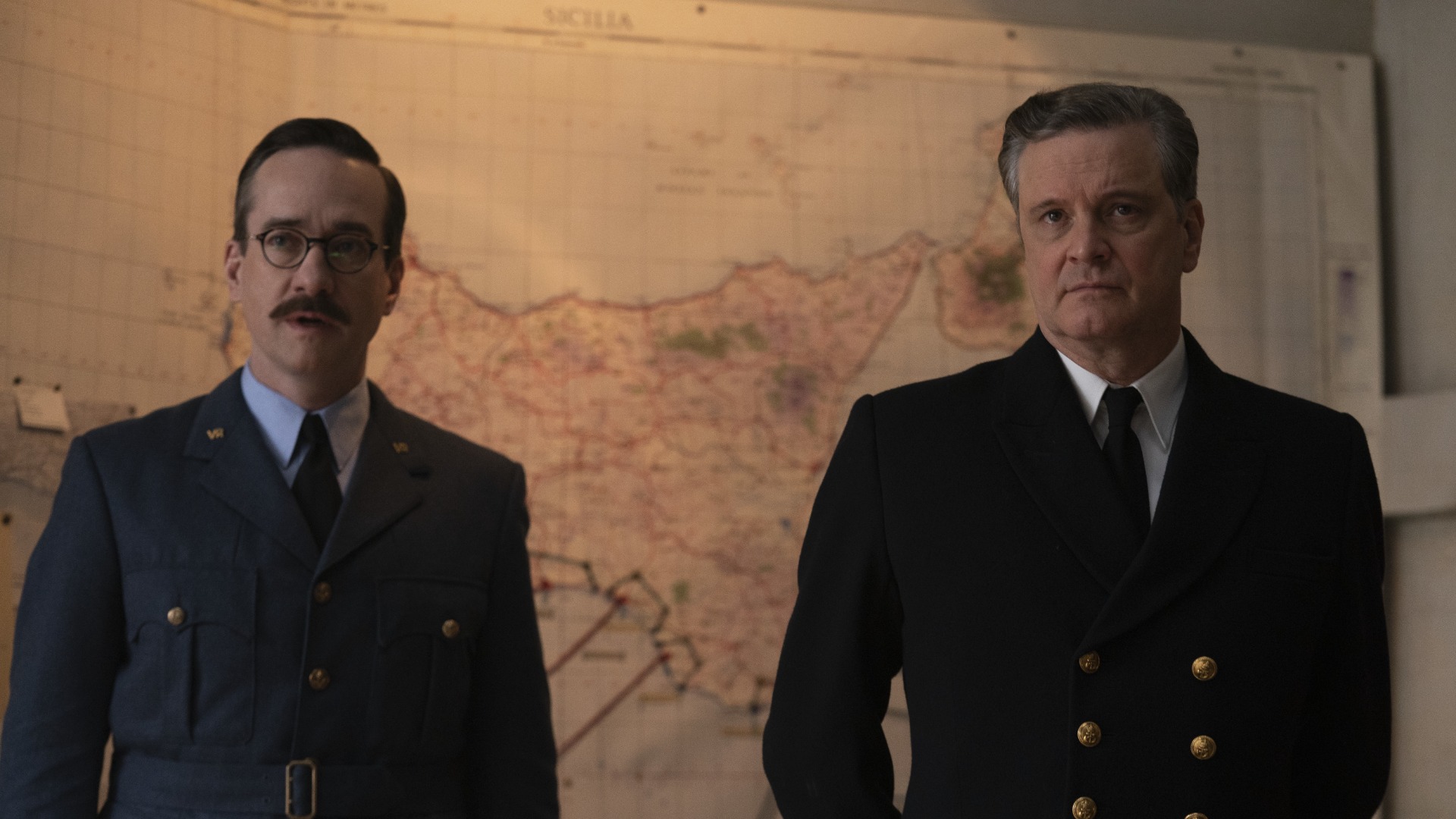Colin Firth, Matthew Macfadyen, and the Operation Mincemeat cast talk us through their new World War 2 movie
Total Film sits down with the Mr. Darcys and Operation Mincemeat's director to discuss the outlandish true story

"If it had been made up, it might have seemed a bit too much, actually," Colin Firth tells Total Film. We’re discussing the real-life events that inspired the actor’s latest movie, Operation Mincemeat, a World War II story about two British intelligence officers, Ewen Montagu (Firth) and Charles Cholmondeley (Matthew Macfadyen), who come up with an improbable disinformation strategy centered on an unlikely secret agent – a dead man.
The pair equip a corpse with classified documents that identify the body as an army major, and set about making sure he washes up on the shores of fascist Spain. The body also holds planted papers revealing a British plan to invade Greece, which Montagu and Cholmondeley hope will go straight into Nazi hands. Why? Because none of it is true – the British are actually invading Sicily.
Before signing onto the film, Jason Isaacs, who portrays Admiral John Godfrey, was as clueless as the Germans – he didn't know anything about the plot until he read the script. "This is what's great, the audiences will arrive with exactly the same notion, 'Oh, I heard about this, and there was some deception at work.'," he says. "And then they get taken into a ride of twists and turns, they don't know who's gonna be responsible for what, which bits are going to work, which bits aren't going to work, which bits have to be salvaged at the edge of disaster. It's a safe and exciting journey for the audience that I took as a reader."

The slightly deranged plan to mislead the enemy by using a dead body sounds like a James Bond novel – and that’s no coincidence. Ian Fleming, creator of 007, worked under Godfrey in Naval Intelligence during the war, with Godrey being the supposed inspiration for Bond’s boss, M.
"Ewen Montagu wrote this book, The Man Who Never Was, which got turned into a film,” says muscicisan-turned-actor Johnny Flynn, who plays Fleming in Operation Mincemeat. “But that was a fake version of these disinformation events, because it was all official secrets until quite recently. The fact that the story that people half have in their heads is actually wrong, and we're giving them a slightly truer version, although all kind of imagined, in terms of what conversations happened in the secret rooms and things, it's fun to slowly reveal the truth."
Rather than taking inspiration from Montagu's text, the movie is based on a book of the same name by historian Ben Macintryre, which was later adapted into a documentary for the BBC in 2010. This time around, thanks to the nature of the film, they were able to take more creative liberties with the story.

"With a feature film, you can do the things that I couldn't do with either the book or with the documentary, which is to imagine the emotional world that exists between the facts," Macintryre explains. "There's a certain amount of speculation that one can do in a nonfiction book, but you have to be really rigorous about that.
Sign up for the Total Film Newsletter
Bringing all the latest movie news, features, and reviews to your inbox
"Whereas [director] John [Madden] and [screenwriter] Michelle [Ashford] have brilliantly taken the raw material, the raw facts of what happened, and created something, which is very true to the spirit of Operation Mincemeat because the whole thing is essentially fictive. It is about imagining a truth that isn't a literal truth and trying to lure the world into it. And in a way that's the warp and weft of this whole story. So it's been wonderful to see it given another life."
With Operation Mincemeat, Madden wanted to make a film that was about the people behind the plot as much as it was about the intricacies of the operation. "My magnetic north in terms of navigating this material was to find the human thread through it," the director says.

"You can say that the four key characters at the center of it really, two men and two women, have their own hidden story going on about their relationship to what they're creating. But ultimately, the arc of the story is one in which they create a fiction which they then become lost in and enveloped by. And that delivers them to a place of terrible uncertainty, because it's a made-up story, and they have no idea whether anybody will believe it."
One of those central women is Jean, a secretary who becomes integral to the operation, portrayed by Kelly Macdonald: "She's there because she's got something to offer, and she's smart, and I loved playing her because she is all that,” she says. “But as you get to know her, you realize she's got this history, and she had lost a love years before and so she ends up involved in this very romantic situation where she's almost becoming this fictitious love of this fictitious airman, and it's all just very innocuous, really, and flirtatious, maybe, but their hearts are involved."
None of these actors are strangers to period dramas (both Firth and Macfadyen have played Mr. Darcy in adaptations of Pride and Prejudice, for example), so what is it about the genre that keeps them – and audiences – coming back? "They're just good stories, aren't they?" says Macfadyen. "And human behavior hasn't changed that much whether you're in a frock coat, or whether you're in a pair of jeans."
Operation Mincemeat will be released in UK cinemas on April 15. For more viewing inspiration, check out our picks of the other upcoming releases to get excited about in 2022 and beyond.
I’m an Entertainment Writer here at GamesRadar+, covering everything film and TV-related across the Total Film and SFX sections. I help bring you all the latest news and also the occasional feature too. I’ve previously written for publications like HuffPost and i-D after getting my NCTJ Diploma in Multimedia Journalism.


